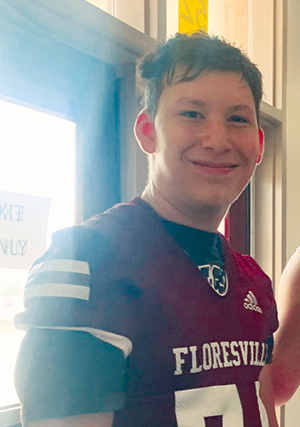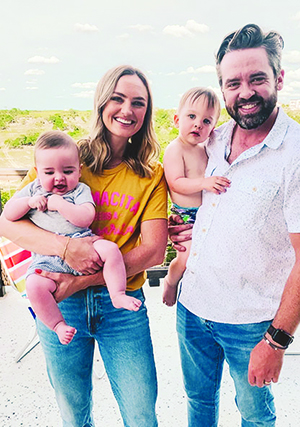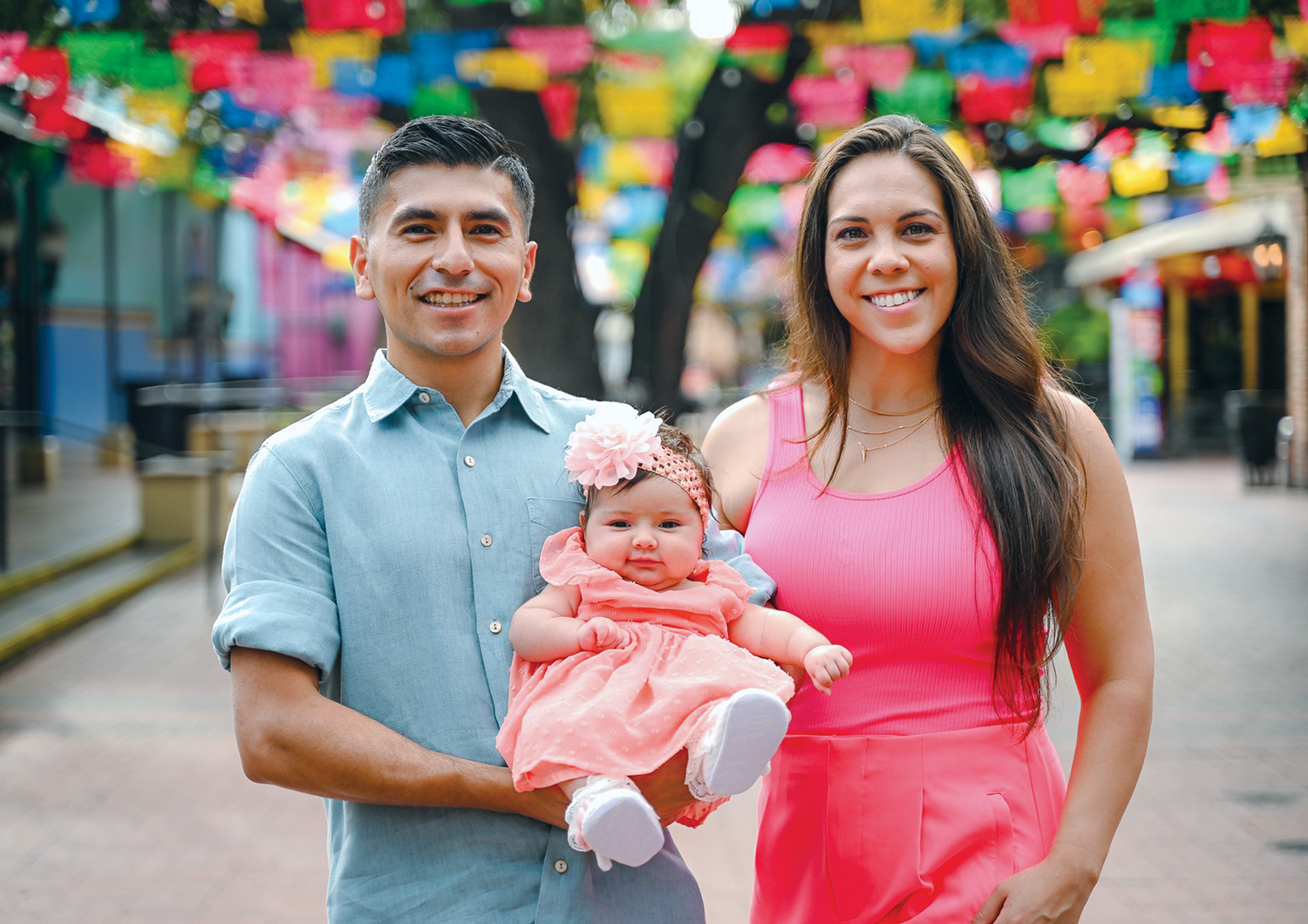
SAN ANTONIO — When Monica Christina and Mario Pozos learned during pregnancy that their baby girl could have spinal muscular atrophy, Monica recalled what she'd learned while studying to be a physical therapist — most babies diagnosed with the most severe form of the genetic disorder would not live to see their second birthday.
"Those five days between that diagnosis and our meeting with Dr. (Melissa) Svoboda were excruciating," Monica recalls.
Mario says the diagnosis "was like a death sentence" for the baby.
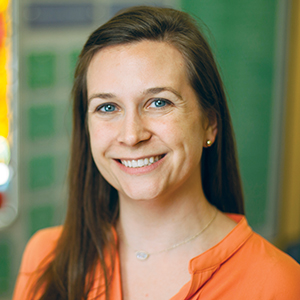
Monica says the couple was not aware of all the advancements in treatment for SMA-1 until they met with Svoboda, CHRISTUS Children's division chief of neurology and neurodevelopment. At that first meeting, Svoboda told them of a gene therapy that, when administered at the start of an infant's development, could diminish and even eliminate the disorder's effects.
"That first appointment with Dr. Svoboda was a miracle!" says Monica. "She said we had the potential to watch Luna go to college. To get married. It took us time to process it and realize this gene therapy is lifesaving and could give Luna a full life."
As the Pozos family approached Luna's first birthday April 2, they credited that Luna is thriving and on a healthy developmental plan to the Zolgensma gene therapy that CHRISTUS Children's gave her at 5 weeks.
One-stop shop
Cris Daskevich, CEO of CHRISTUS Children's and senior vice president of maternal services for CHRISTUS Health, says the San Antonio children's hospital is able to offer patients like Luna cutting-edge treatments because of a service line expansion underway for the past several years. Since learning through assessments that many South Texas families were having to leave the region to obtain pediatric services, CHRISTUS Health has been investing heavily in expanding care access in six focus areas that it calls its pillars of excellence. The Center for Neurosciences that has been handling Luna's care is one of those pillars.
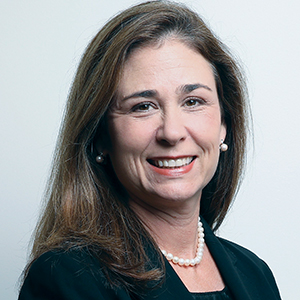
Daskevich says CHRISTUS Children's has been building out the infrastructure of the neurosciences center at the flagship hospital in downtown San Antonio and at a network of freestanding pediatric emergency rooms, maternal and pediatric specialty clinics, and outpatient speech, occupational and physical therapy clinics. CHRISTUS Children's has been recruiting neurology specialists, subspecialists and other clinicians with expertise in the field. It has built out a multidisciplinary team and wraparound services so that patients with a wide variety of neurological conditions can obtain expert clinical care and access child life, physical therapy, occupational therapy, genetic counseling, nutritional counseling, and other support services. Patients' families also can get navigation help with obtaining care in the community and with social services.
"We're working hard to be a one-stop shop," says Svoboda. "We do all we can to envelop the family."
Three focus areas
The neurosciences center treats conditions affecting the brain, spinal cord, nervous system and muscles. The center's services generally are grouped around three main diagnostic areas: neuromuscular conditions, epilepsy and autism.
According to a Feb. 23, 2024, article in Frontiers in Neurology, there are about 600 different pediatric neuromuscular diseases affecting about 1 in 3,000 people worldwide. Neuromuscular conditions affect the nerves controlling the body's voluntary muscles. Some of these conditions include muscular dystrophy, neuropathy, myopathy and SMA. The neurosciences center has a multidisciplinary team that addresses these and related conditions with a variety of therapies, including gene therapy, surgical intervention, medication, physical therapy and occupational therapy. According to Svoboda, CHRISTUS Children's is a Muscular Dystrophy Care affiliate and one of the few South Texas providers to offer lifesaving gene therapy for Duchenne muscular dystrophy.
There also is a category of rare genetic disorders called leukodystrophies that affect the central nervous system. Svoboda says CHRISTUS Children's has the only leukodystrophies care network in Texas.
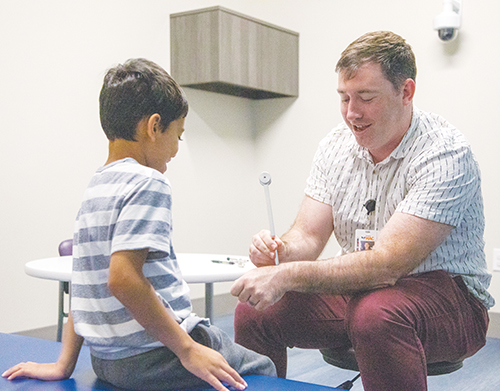
CHRISTUS Children's website says epileptic seizures happen in kids when electrical activity in the brain changes their awareness, movement or behavior. The Centers for Disease Control and Prevention says about 456,000 U.S. children aged 17 and younger have active epilepsy. The neurosciences center has a multidisciplinary team that helps devise tailored treatment plans. That treatment could include surgery. A CHRISTUS Children's blog showcases patient success stories, including numerous cases in which surgery has eliminated seizures.
The CDC says about 1 in 36 children has been identified with autism spectrum disorder. The CHRISTUS Children's website says autism can present as a lack of emotion or empathy, no eye contact, or speech delay in children.
The CHRISTUS Children's autism team can assess whether a child has autism and provide needed treatment, such as applied behavioral analysis therapy.
At the pediatric hospital's Extension for Community Healthcare Outcomes, or ECHO, Autism Center, team members share their expertise with others. Mainly through virtual sessions, they mentor and educate community members, educators, advocates and others on autism. Their outreach is particularly valuable to underserved, remote and rural communities without nearby access to autism professionals.
No other providers
Svoboda says she finds the wide continuum of services and support that CHRISTUS Children's has built exciting. "We are the only ones in South Texas doing some of these therapies," she says.
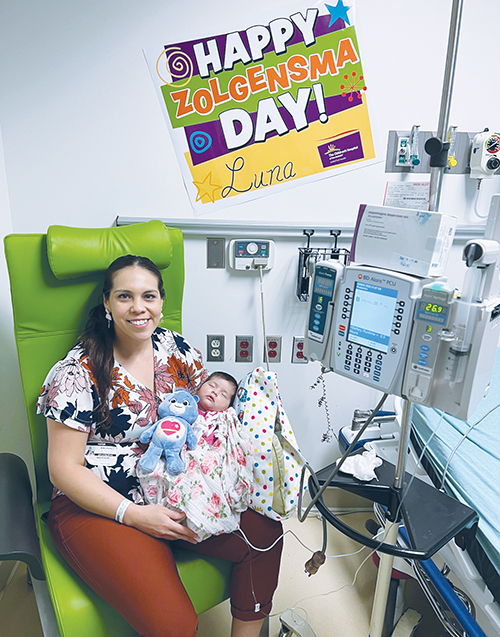
For some of the advanced genetic work, the pediatric hospital is one of just a few facilities in the nation offering such care, Svoboda says. She notes that it is in part because of philanthropy that the neurosciences center has been able to build out its programming so effectively.
Svoboda says that neurological conditions often involve years of treatment for patients, and that can be disruptive and difficult for them and their families. Having to go to numerous appointments over many years is taxing, especially for working families and families with socioeconomic barriers, she says. She notes that it is vital to such families in South Texas that advanced treatment is available nearby.
Monica and Mario Pozos say they certainly are grateful for this. The children's hospital is just a few miles from their San Antonio home. They say they are amazed that the exact, extremely advanced care their daughter needed was so close by.
Glowing with love
The couple say that the past year and a half has been a blur of blood tests, doctor appointments, medical emergencies, anxiety, elation and, perhaps now, some stability.
SMA was nowhere on the couple's radar screen when a 12-week prenatal blood test revealed Monica was a carrier of a recessive gene for SMA. Follow-up genetic testing of Mario revealed he too carried the recessive gene. A cheek swab of Luna immediately after her birth confirmed she had the most severe form of the condition, SMA-1.
Mario says CHRISTUS Children's team has been a constant presence in their lives since the couple's status as carriers was verified. This included when Monica had a medical scare while Luna was in utero — once the CHRISTUS Children's team verified Luna was unharmed, Monica underwent a surgery at a different local hospital. The CHRISTUS Children's team also played a vital role when tests just prior to the baby's gene infusion flagged potential heart problems for Luna that turned out to not be a threat.
Just one early injection was needed to save Luna's life and change the trajectory of her neuromuscular condition. Once she was past the three-month recovery time from the injection, she began routine visits to CHRISTUS Children's to get physical, speech and other therapy.
Mario says Luna loves her team of providers, and they have shown their love for her. "Every time they see her, they glow with love, and she reciprocates — she gets so excited to see them," Mario says.
He adds, "It is invaluable to have this team in her life."

